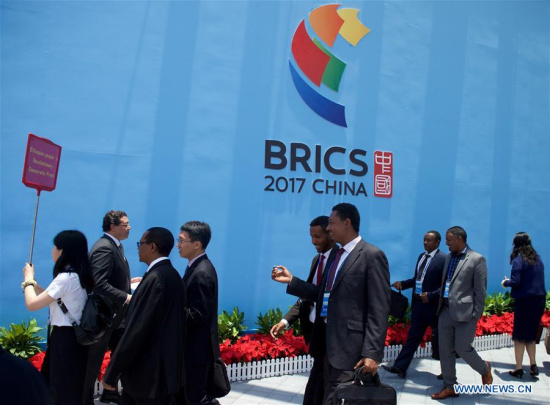
Guests walk out of the venue of the opening ceremony of the BRICS Political Parties, Think-tanks and Civil Society Organizations Forum in Fuzhou, capital of southeast China's Fujian Province, June 11, 2017. The 9th BRICS Summit will be held in Xiamen on Sept. 3-5. (Xinhua/Jiang Kehong)
BRICS countries must join hands and work harder to create new impetus for economic growth as the emerging-market bloc is embarking on a journey to usher in the second "golden decade."
This appeal was made by Chinese President Xi Jinping Sunday to open the two-day BRICS Business Forum, ahead of a summit of the leaders of Brazil, Russia, India, and South Africa in the southeastern coastal city of Xiamen. [Special Coverage]
"We should boost BRICS cooperation to create new impetus for economic growth in our five countries," Xi told over 1,000 business leaders.
Coined by former Goldman Sachs economist Jim O'Neill in 2001, the term "BRIC" referred to Brazil, Russia, India and China, four emerging economies with fast growth and great potential. In 2006, foreign ministers of those countries met in New York to formally establish the BRIC grouping. When South Africa joined in 2010, the acronym changed to BRICS.
Since the mechanism came into being 10 years ago, the five countries have improved macroeconomic policy coordination, promoted structural reform, infrastructure and taxation cooperation, and pushed forward progress in fiscal and financial domains.
With strengthened cooperation and coordination, the BRICS nations have seen robust economic growth, and are now key players in the world economy and in global governance.
In the past decade, combined GDP of the bloc has grown by 179 percent, trade by 94 percent and urban population by 28 percent, contributing significantly to stabilizing and growing the global economy.
As the source of more than half of global growth, the bloc accounted for 23 percent of the 2016 global economy, almost double the share in 2006.
However, as the five economies continue to grow, challenges, from issues concerning resource allocation and industrial structure domestically to shrinking global demand and rising financial risks, have emerged to dent their traditional strengths.
This is why Xi said the BRICS countries have come to "a crucial stage where we must work harder to overcome difficulties."
To get through this stage, the five countries should advance structural reform and explore new growth drivers and development path, instead of fixating their eyes on the growth rate.
They should seize the opportunity presented by the new industrial revolution to promote growth and change growth models through innovation.
Xi pointed to smart manufacturing, the "Internet Plus" model, digital economy and sharing economy as areas where the emerging economies should build new growth drivers to replace old ones.
He also called for eliminating impediments to economic development through reform, removing systemic and institutional barriers, and energizing the market and society, so as to achieve better quality, more resilient and sustainable growth.
This year, the emerging market bloc has made progress in the operation of the New Development Bank and Contingent Reserve Arrangement, and in e-commerce, trade and investment facilitation, trade in services, local currency bond issuance, scientific and technological innovation, industrial cooperation and public-private partnership.
There is still great potential for the BRICS countries, who are at a similar development stage and share the same development goals, to expand cooperation and jointly explore ways to boost innovation-driven growth.
The five countries should improve macroeconomic policy coordination, synergize their development strategies, leverage their strengths in terms of industrial structure and resources endowment, and create value chains and a big market for shared interests.
As a relatively young mechanism, BRICS will likely face more ups and downs in the future, especially amid a sluggish global economic recovery and setbacks in globalization.
However, BRICS countries will not lose their luster and the Xiamen summit comes at just the right time to put a new shine on emerging market and developing countries and usher in its new golden decade.


















































